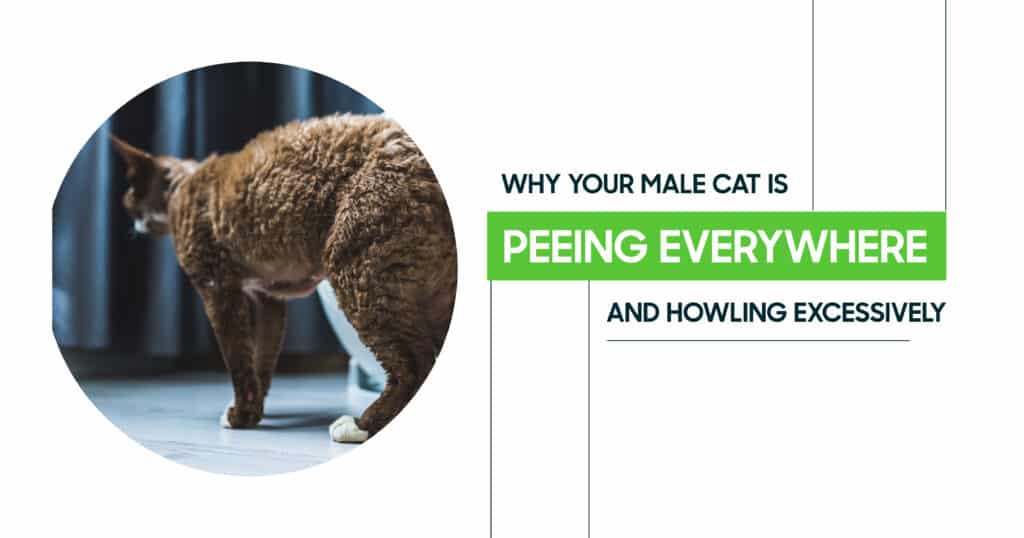Few things are more distressing for cat owners than finding puddles outside the litter box and hearing endless howling through the night. If you’ve been wondering, “why is my male cat peeing everywhere and meowing so much?” — you’re not alone. These behaviors are common but often misunderstood.

Excessive peeing and vocalization in male cats can stem from a wide range of causes — from medical issues like urinary tract infections (UTIs) to behavioral factors such as territorial marking, stress, or attention-seeking behavior. Understanding the “why” behind your cat’s actions is the first step toward helping him feel better — and restoring peace at home.
Let’s explore what might be going on with your feline friend and how Vet Today can help.
Understanding Why Your Male Cat is Peeing Everywhere and Meowing So Much
When a male cat starts urinating outside the litter box and meowing excessively, it’s usually a sign that something isn’t right — physically, emotionally, or environmentally. Cats are creatures of habit, and any change in behavior signals discomfort or distress.
In many cases, excessive urination can indicate:
- A medical condition, such as a urinary tract infection or bladder stones.
- Territorial marking behavior, especially in unneutered males.
- Stress or anxiety is often triggered by environmental changes.
- Litter box issues, like a dirty box or an unpleasant location.
Exploring Medical Causes of Excessive Peeing and Meowing
Medical issues should always be your first consideration. Cats are experts at hiding pain, and vocalizing or urinating in unusual places may be their way of asking for help.
Identifying Urinary Tract Infections in Male Cats
A urinary tract infection (UTI) is one of the most common medical causes of frequent urination and howling in male cats. Inflammation of the bladder or urethra can make urination painful, leading cats to associate the litter box with discomfort and seek other places to relieve themselves.
Symptoms to watch for include:
- Straining or crying while urinating
- Small amounts of urine or frequent attempts to go
- Blood in the urine
- Excessive licking of the genital area
- Peeing outside the litter box
According to the Cornell Feline Health Center, roughly 1–3% of cats develop feline lower urinary tract disease (FLUTD) annually, with males being more prone due to their narrower urethra. If left untreated, these infections can lead to urinary blockages, a life-threatening emergency.
Recognizing Other Underlying Medical Conditions
UTIs aren’t the only culprit. Other conditions that may cause frequent urination or vocal distress include:
- Bladder or kidney stones
- Diabetes mellitus
- Hyperthyroidism
- Kidney disease
- Urinary crystals (struvite or calcium oxalate)
Each condition can cause discomfort or increased urine output, prompting both behavioral changes and loud meowing. A veterinarian can diagnose these issues with a urinalysis, blood tests, and imaging.
Behavioral and Emotional Triggers Behind These Actions
If medical issues are ruled out, behavioral factors are the next area to explore. Cats communicate primarily through scent and sound, and their behaviors often serve a purpose — even if it seems perplexing to us.
The Role of Territorial Marking and Hormonal Changes
Unneutered male cats are notorious for territorial marking, especially when they sense other cats nearby. Spraying — a form of urination meant to mark territory — is their way of signaling ownership or responding to perceived threats.
This behavior can be triggered by:
- A new pet or visitor in the home
- Stray cats seen through a window
- Moving to a new environment
- Changes in routine
Hormonal changes also play a role. Testosterone increases dominance-driven behaviors such as spraying and vocalization. Neutering can significantly reduce or eliminate these tendencies; in fact, studies show that over 90% of male cats stop spraying within months of being neutered.
Understanding Feline Stress and Anxiety
Cats are sensitive to changes — even subtle ones. Feline stress can manifest in physical and behavioral ways, including inappropriate urination and excessive meowing. Common causes include:
- A new baby, pet, or family member
- Rearranging furniture or moving homes
- Loud noises or environmental disruptions
- Boredom and lack of stimulation
Stress activates the cat’s “fight or flight” response, often resulting in anxious vocalizations and loss of litter box habits. Using pheromone diffusers, providing hiding spots, and maintaining consistent routines can help calm your cat.
Common Environmental Problems and Their Fixes
Sometimes the reason your male cat is peeing everywhere isn’t medical or emotional — it’s environmental. Cats are particular about their surroundings, and small issues can lead to big messes.
Litter Box Issues and Attention-Seeking Behavior
If your cat is avoiding the litter box, check for the following:
| Litter Box Factor | Description & Recommendation |
| Cleanliness | Cats prefer a pristine litter box. Scoop waste daily and replace the litter regularly to prevent odors and buildup. |
| Litter Type | Some cats dislike scented or coarse litter. Try experimenting with unscented, fine-textured varieties that feel softer on their paws. |
| Location | Place the litter box in a quiet, low-traffic area. Avoid spots near loud appliances or busy pathways that may cause anxiety. |
| Number of Boxes | Maintain at least one litter box per cat, plus one extra — especially in multi-cat households — to reduce competition and stress. |
When to Seek Professional Help from Vet Today
If your male cat continues to urinate outside the litter box or howl excessively, it’s time to consult a veterinarian. Delaying could put your cat’s health at serious risk — particularly if a urinary blockage is present.
Addressing the root cause — not just the symptom — ensures lasting relief for both you and your pet. If your cat’s behavior has you worried or confused, don’t wait. Visit Vet Today to schedule a consultation with our feline experts.

FAQs
What are the common signs of a urinary tract infection in male cats, and how can it affect their peeing behavior?
UTIs can cause painful, frequent urination, blood in the urine, and crying during urination. They often make cats associate pain with the litter box, leading to accidents elsewhere.
How does territorial marking contribute to male cats peeing everywhere, and what can be done to manage it?
Male cats may spray urine to mark their territory or respond to nearby animals. Neutering, cleaning marked areas with enzyme cleaners, and limiting exposure to outdoor cats can help reduce this behavior.
In what ways does feline stress lead to excessive meowing and inappropriate urination in male cats?
Stress disrupts a cat’s sense of security, leading to behavioral changes like meowing or peeing outside the litter box. Reducing stressors and maintaining a predictable routine helps calm these behaviors.
How do hormonal changes impact a male cat’s behavior, including increased meowing and urination?
High testosterone levels can increase marking and vocalization. Neutering helps balance hormones, often reducing these behaviors dramatically within a few weeks.
What are the potential litter box issues that cause male cats to urinate outside the box, and how can they be resolved?
Dirty boxes, strong-smelling litter, or poor placement can deter cats from using their box. Keeping it clean, choosing the right litter type, and offering multiple boxes can solve most cases.





